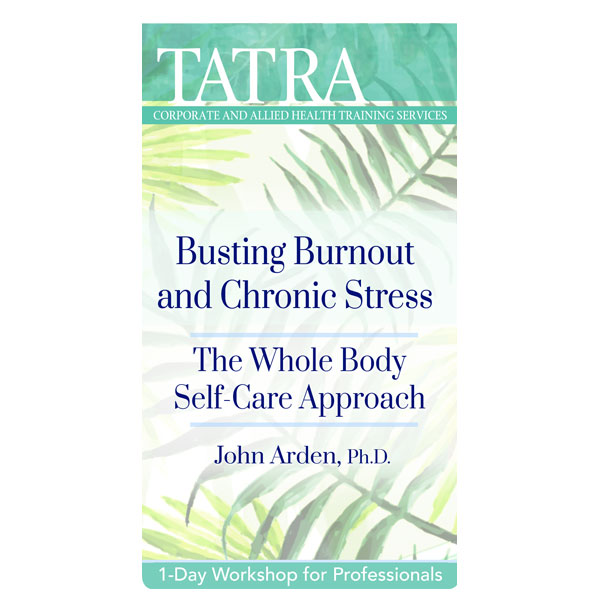Busting Burnout and Chronic Stress: The Whole Body Self-Care Approach

John Arden, PhD, ABPP
This seminar will examine the use of Brain-Based Therapy to enhance outcomes with people who suffer from Chronic Stress, Burnout and Compassion Fatigue. Dr Arden will show you how self-care behaviours have major effects on the immune system, the brain, and the body in general, and how these interactions have a profound effect on mental health.
Course Dates
Sydney: 10 March 2020, SMC Conference & Function Centre
Melbourne: 13 March 2020, Bayview on the Park
Brisbane: 19 March 2020, Mantra on Queen
9:15am to 4:30pm
This seminar will examine the use of Brain-Based Therapy to enhance outcomes with people who suffer from Chronic Stress, Burnout and Compassion Fatigue.
Dr Arden will show you how self-care behaviours have major effects on the immune system, the brain, and the body in general, and how these interactions have a profound effect on mental health.
There are now overwhelming numbers of people throughout the developed world plagued with health problems brought on by poor physical and emotional self-care, they suffer bidirectional causal pathways between acquired physical and psychological impairments.
The Centre for Disease Control estimates that health behaviours account for 50% of adverse health outcomes—as much as genetics (20%), the environment (20%), and access to health care (10%) combined. The statistics suggest that half of all health conditions are preventable by changes in self-care behaviour (Amara et al., 2003).
Research has also found that 40% of medical patients have a comorbid psychological disorder, while 75% of patients with a psychological disorder also suffer with a comorbid physical disorder. Essentially, health behaviours represent the interwoven natures of physical and mental health.
Because over half the population unknowingly suffers from self-inflicted immune system dysregulation, psychotherapy in the 21st century must promote lifestyle and behavioural health changes. This means that whole body self-care factors should be addressed as foundational factors to mental health. To conduct therapy without addressing these underlying factors is like building a house on a sandbar by a hurricane-swept beach.
Brain-Based Therapy synthesizes neuroscience, evidence-based treatment, psychotherapy research, and attachment theory into a hybrid therapeutic model and it envisions the therapeutic process as a method to change the brain in order to change mood and behaviour. The role that brain function plays in mood, memory and behaviour will be discussed, including the effect of diet and alcohol on the brain and mental health over the life span. You will learn how to use Brain-Based Therapy to more effectively educate and treat clients with chronic stress and inflammation that enables stress, burnout and disease.
Dr Arden will offer invaluable help in recognizing, controlling, and reducing chronic stress and preventing burnout and compassion fatigue. Since chronic stress may intensify the progression of other diseases or conditions, Dr. Arden will explore the interaction between chronic stress and medical problems including diabetes, thyroid conditions, and many more.
Throughout the workshop, he will offer helpful strategies that are based in the newest brain research and that will assist you to adapt to stress. There will be a discussion about medication and the common effects and the side effects. Dr Arden will also discuss nutrition including the major amino acids found in various foods and their effects on mood and cognition.
This is a fundamentally important workshop that will help you and your clients to cope with stress, to minimize its negative effects, and to protect your health and improve the quality of life.
COURSE OBJECTIVES
- Calm the stress response through increasing durability and flexibility.
- Reduce intrusive thoughts and impulses through therapies changing the habit circuits in the brain,
- Enhance social reasoning through the key interpersonal techniques.
- Relieve anxiety, elevate mood, and deepen sleep through multi-level approaches.
- Reduce pain in clients undergoing medical and dental treatment through mind-body therapies.
- Elevate positive emotions through the practice of positive psychology.
- Put to practice the attitudinal transformation associated with resiliency.
- Apply the five fundamental healthy factors encoded in the mnemonic SEEDS.
SEMINAR OUTLINE
- Why Whole Body Self-Care is Key to Long-Term Health.
- Self-care behaviours that have major effects on the immune system, the brain, and the body.
- How chronic stress and poor self-care inappropriately activate the immune system with damaging effects leading to chronic conditions and dysregulated immune systems.
- Chronic inflammation as a common factor between many psychological disorders and poor health.
- Reduction of stress and anxiety methods.
- Factors that improve resiliency.
- Attitudinal factors that improve life satisfaction.
- Enhancing gene expression through healthy behaviors.
- Psychotherapy research:
- The demise of Pax Medica, evidence-based practices, what clients say works.
- New developments in neuroscience that inform and can be a part of the dialogue in therapy.
- Affect asymmetry, neuroplasticity, neurogenesis, social brain networks, the prefrontal cortex, the fast and slow routes to the amygdala.
- The role of diet with respect to how healthy brains can be enhanced on the one hand and destabilised on the other.
Amino acids – precursors to neurotransmitters, essential fatty acids, simple carbs – how glycation impairs the brain, role of alcohol and other drugs in creating symptoms of dysfunction, alcohol – understanding residual cognitive and mood effects, marijuana – factoring out memory and mood problems.
- How stress is reconceptualised
- Allostasis
- Allostatic load affecting the brain and psychological functioning
- Brain-based therapeutic approaches for panic and flashbacks
- The fast and slow track to the amygdala
- Interceptive exposure
- Brain-based therapeutic approaches for clients with PTSD with depression
- The role of anxiety
- Cytokines and “sickness behaviour”
- The effort-driven reward system
- The use of mindfulness
- Approach behaviours and engagement
- Regulation of the immune system
- Recalibrating the brain Normal Sleep Architecture
- Pathologic blunting of slow wave sleep (e.g. drugs, alcohol, caffeine)
- The Importance of Sleep for the Brain
- Thoughts about sleep add to daytime stress. Defusing NSTs
- Avoiding sleep depressors
- Negative sleep thoughts
- Body temperature
- Diet factors that improve sleep
- How exercise earlier in the day improves sleep
- Evening behaviours that enhance sleep
- APS: Activities do not need to be endorsed by APS. Members can accrue 7 CPD hours by participating in this activity
- AASW: Members can accrue 7 CPD hours by participating in this activity
- ACA: Members can accrue 5 CPD points by participating in this activity
A certificate of attendance will be emailed to participants following the workshop.


